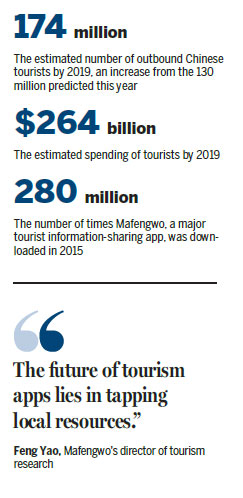Going mobile
Updated: 2016-01-20 07:45
By Yang Feiyue/Li Jing(China Daily)
|
||||||||
Smartphones are advancing China's outbound tourism boom. Li Jing and Yang Feiyue report.
For adventurous travelers like Chen Yu, deciding where to go on holiday used to involve hours of scouring guidebooks for tips on attractions, decent hotels and how to get around in a foreign land.
"Now, all I need is my smartphone," the 35-year-old Beijinger says.
Rapid technological advancement means even cheap mobile phones are effectively palm-top computers.
Avid travelers have been among the biggest beneficiaries of this technological revolution. They can book flights and hotels in an instant, use "digital wallets" to buy souvenirs, post reviews on the fly, and download apps that offer detailed maps and guides of far-flung places - all in their native language.
"An app can lead me straight to a place serving authentic food, a popular show or to an experience that gives me a taste of the local life," Chen says.
Mobile-Internet development has undoubtedly contributed to China's outbound tourism boom, which led to the country becoming the world's biggest source of tourists in 2012.
Bank of America Merrill Lynch has estimated the number of outbound Chinese may increase from the 130 million predicted this year to about 174 million by 2019, with tourist spending increasing to $264 billion.
"Technological advances have been key, as the Internet has reduced travel costs and made exotic destinations more viable (for Chinese tourists)," says Zhu Zhengyu, an analyst at Analysys International.
"It has also led to more Chinese traveling independently rather than in groups."
It's not just tourists who have benefited. Travel agencies have also been able to reduce costs, while tech firms have latched on to the opportunities created by a fast-growing market.
"The Internet has allowed travel agencies to close brick-and-mortar offices, cut out the middleman and gain easier access to target customers," Zhu says.
"Since 2014, many companies have also launched smartphone apps aimed at Chinese travelers, providing services like car rentals and restaurant reviews, which remove the language barrier and facilitates independent travel."
In fact, despite China coming late to the Internet, studies suggest the nation's tourists are now the most connected in the world.
The Chinese International Travel Monitor, compiled by online-booking agency Hotel.com, says at least 50 percent of tourists arranged a holiday through a smartphone app in 2015, up 17 percent year-on-year.
In December, TripBarometer, the research arm of TripAdvisor, also released its 2016 Travel Trends. The report includes a poll of 44,000 global travelers that found 75 percent now see mobile devices are the most essential item for a holiday, overtaking toiletries. Among Chinese respondents, it was 87 percent.
Tech companies have been quick to see the potential in China's outbound-tourism market.
One example is Yidao Yongche, an Uber-like app that provides Chinese-speaking drivers to Chinese travelers in 25 cities overseas. Launched as a car-rental website in 2010, the company shifted focus when mobile-Internet devices started to become popular in China.
"Most Chinese don't speak English, so they find it difficult to communicate with foreign drivers after they land in another country," founder and CEO Zhou Hang says.
Yidao Yongche has offices in Paris, London, Edinburgh and Manchester in Europe, as well as New York, San Francisco, Los Angeles and Phoenix in the United States. It offers such services as airport pickups for passengers who book flights through Ctrip, a major online travel agency and an investor in the app.
China is also arguably the most competitive market for websites and apps that allow tourists to post reviews and swap travel stories.
TripAdvisor is the biggest player in the West and beyond; at least half of its total revenue is generated in North America, with 33 percent coming from Europe and the Middle East. Yet in China, local rivals such as Mafengwo and Qyer are providing stiff competition.
Founded in 2010, Mafengwo is a major tourist information-sharing website and has invested heavily in its mobile Internet services. The company says its app, launched in 2015, has been downloaded 280 million times and has more than 80 million active users.
"The future of tourism apps lies in tapping local resources," says Feng Yao, Mafengwo's director of tourism research.
Mafengwo opened scores of offices in overseas markets in 2015, such as in Phuket and Chiang Mai in Thailand, and is now working with local tourism companies to offer services at lower prices directly to users.
Shanghai-based Dianping, a business-listings website similar to Yelp, has also extended its reach to 860 cities in more than 200 countries and regions overseas, with the most-common searches being for services in Japan, Thailand and South Korea.
Thanks to the technology, industry sources and analysts see no slowdown ahead for China's outbound tourism.
Contact the writers through yangfeiyue@chinadaily.com.cn


|
Chinese visitors take a selfie in the French president’s office at the Elysee Palace in Paris. Provided To China Daily |
(China Daily 01/20/2016 page19)

 Glenn Frey, founding member of the Eagles, dead at 67
Glenn Frey, founding member of the Eagles, dead at 67
 Glass bridge across Zhangjiajie Grand Canyon under construction
Glass bridge across Zhangjiajie Grand Canyon under construction
 The life of a wood carving artist
The life of a wood carving artist
 Top 10 satisfying cities of China in 2015
Top 10 satisfying cities of China in 2015
 Square dance lovers find underground garage their new stage
Square dance lovers find underground garage their new stage
 The world in photos: Jan 11 - 17
The world in photos: Jan 11 - 17
 Commemorative coins for Year of Monkey issued across China
Commemorative coins for Year of Monkey issued across China
 Throw a flower ball to find Mr Right
Throw a flower ball to find Mr Right
Most Viewed
Editor's Picks

|

|

|

|

|

|
Today's Top News
National Art Museum showing 400 puppets in new exhibition
Finest Chinese porcelains expected to fetch over $28 million
Monkey portraits by Chinese ink painting masters
Beijing's movie fans in for new experience
Obama to deliver final State of the Union speech
Shooting rampage at US social services agency leaves 14 dead
Chinese bargain hunters are changing the retail game
Chinese president arrives in Turkey for G20 summit
US Weekly

|

|








